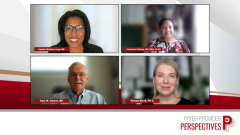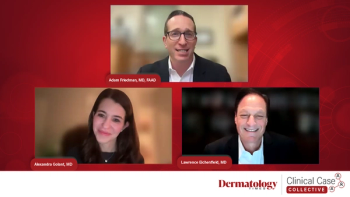
Resources for Patients With Vitiligo
Chesahna Kindred, MD, MBA, FAAD, reviews the vitiligo support groups recommended for patients.
Episodes in this series

Heather Woolery-Lloyd, MD: We’ve been talking about quality of life a lot during this discussion, and there are some resources that we can offer our patients with vitiligo. [Dr Kindred], what support groups do you recommend for your patients with vitiligo?
Chesahna Kindred, MD, MBA, FAAD: Vitiligo, I tend to direct patients to the National Vitiligo Foundation [NVF], [which provides] a lot of resources, even if it’s just the website. Then also for children, we have Camp Discovery, and I think it gives the chance for the kiddos to just not have their skin be front of mind. I find that patients find talking to other patients—it just makes a world of difference, even if the patient is telling them the exact same thing that I said. Again, the NVF. Patients have found that to be the most useful out of all of our resources.
Heather Woolery-Lloyd, MD: Yes, I agree. The National Vitiligo Foundation is so helpful. I do regularly discuss that with patients, especially newly diagnosed patients with vitiligo who may not be aware of it. I also talk about, for people who want to discuss coverage, we talk a little bit about makeup coverage. But those types of discussions, patients really learn from each other—what works best, what doesn’t work, which one is waterproof, which one isn’t. I really think that those types of discussions that occur in those support groups are most practical for our patients because we can talk all day and give our whole spiel, but just discussing and sharing your concerns with someone who also has vitiligo, I think, is extremely helpful. I think we should all be utilizing these foundations.
Thanks to all of you for this very rich and informative discussion. Before we conclude, I’d like to get some final thoughts from each of you. [Dr Kindred], what are some final thoughts you had about our discussion today?
Chesahna Kindred, MD, MBA, FAAD: One, this is a great time that we have a new safe medication for vitiligo. And boy, did I get some great tips from [Dr Owens] as far as how payers see the medications.
Heather Woolery-Lloyd, MD: Yes. [Dr Owens], tell us your final thoughts.
Gary M Owens, MD: I think my final thought is this is a disease state that we’re becoming more aware of now simply because we have an effective treatment and we’re going to have more treatments in the future. This is one that, while payers haven’t focused on it in decades, we really do benefit from discussions like this because we learn an equal amount from you, who take care of these patients, and how best we can help balance cost and access in a way that makes us not only responsible stewards of the health care dollar but also responsible managers of patient care in a way that optimizes it for those patients.
Heather Woolery-Lloyd, MD: Yes, I think that that’s so important because we have something new. We want to make sure our patients can get it. That’s really helpful. Renata, some final thoughts?
Renata Block, PA-C: Yes. First of all, thank you. This panel was amazing, and I have learned a lot from all of you. Thank you, and I’m so excited to share this with everybody, our colleagues. I think the bottom line here is education. Education from our colleagues, empowering our patients with education, understanding the why, why this is so important. There [are] so many reasons why we need to treat these patients, and making sure that all parties who are involved in taking care of the patients, [from] the dermatology clinic to the insurance company to the pharmacy, is very important, and that is going to allow our patients to get better.
Heather Woolery-Lloyd, MD: Yes, I agree. It really does take a multidisciplinary approach especially when it comes to these newer medications. Thank you to all of you. You’ve been a phenomenal panel. I’ve learned so much in this discussion today. Thank you to our viewing audience. We hope that you’ve found this program to be useful and informative.
Transcript edited for clarity.
Newsletter
Like what you’re reading? Subscribe to Dermatology Times for weekly updates on therapies, innovations, and real-world practice tips.










